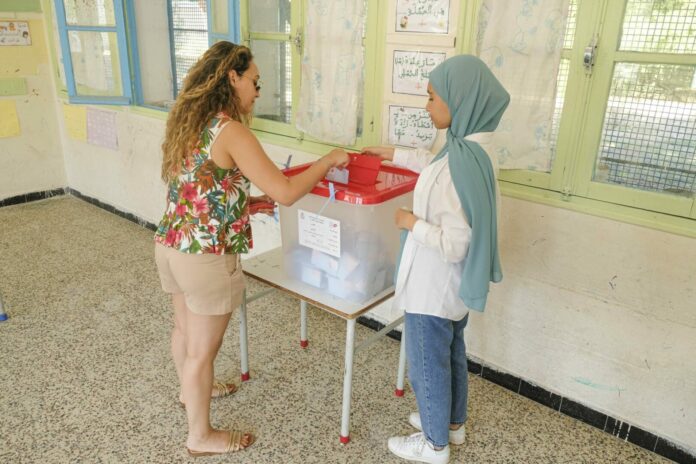TUNISI (TUNISIA) (ITALPRESS/MNA) – Almost 10 million Tunisians head to the polls today for a vote in which political observers say incumbent President Kais Saied, 61, is poised for victory amid what many have deemed a rollback in rights and freedoms as a number of his critics are behind bars, mounting criticism in Tunisia and abroad.
Saied, a little known law lecturer, was thrust to power in 2019. However, in 2021, he staged a sweeping power grab, jailing many of his critics. He dismissed the Islamist-led parliament and the following year he rewrote the constitution. Political experts consider this as a major step back for Tunisia, a country that long prided itself as the birthplace of the Arab Spring uprisings of 2011.
There have been no campaign rallies or public debates and nearly all the campaign posters in city streets have been of Saied.
Fourteen candidates were barred from joining the race, after election organizers ruled they had failed to provide enough signatures of endorsement, among other technicalities. Some have been jailed after being convicted of forging signatures.
Jailed opposition figures include Rached Ghannouchi, head of the Islamist-inspired opposition party Ennahdha, which dominated political life after the revolution.
Also detained is Abir Moussi, head of the Free Destourian Party, which critics accuse of wanting to bring back the ousted regime.
The result has been that Saied faces just two challengers, one of them, former lawmaker Zouhair Maghzaoui, a supporter of the president’s 2021 power grab who “remains associated” with him.
The second challenger, Ayachi Zammel, is also a former lawmaker and leads a small liberal party. His candidacy was approved by election organizers shortly before he was charged with and later convicted of forging voter endorsements. He currently faces more than 12 years in prison. The jail sentence doesn’t affect his candidacy.
The political outsider won by a landslide, with 73 percent of the vote in a second round runoff that saw turnout of 58 percent.
He had campaigned on a platform of strong government after nearly a decade of deadlock between Islamist and secular blocs since the 2011 revolution.
The final results of the presidential election will be announced by Nov 9, at the latest. Tunisia holds a presidential election every five years, with Saied having served as president since his election in 2019.
But the country’s economy struggled to find stability, and political infighting, terrorism and violence hampered progress. Unemployment is at 16%, among the highest in the region, and many of the country’s youth struggle to find jobs. Tunisia is still dependent on international lenders like the IMF, World Bank, and EU, owing over $9 billion. Talks for a $1.9 billion bailout package from the IMF have stalled, as Saied refuses to implement the required reforms – particularly unpopular ones, such as cutting subsidies on essential goods.
The country’s economic situation has driven an increasing number of Tunisians to risk their lives in perilous journeys to Europe.
While many Tunisians flee, the country also serves as a transit point for sub-Saharan African migrants seeking to reach Europe.
Saied’s government has responded with harsh anti-migrant policies, deporting many and dismantling makeshift camps.
On the international stage, Saied has publicly resisted Europès pressure to act as a “border guard” for migrants crossing the Mediterranean, despite agreements to cooperate on migration management.
Tunisia has also strengthened ties with Iran and China, securing investment for infrastructure projects. Nevertheless, European countries remain Tunisiàs primary trade partners, and the Saied administration continues to engage diplomatically with Europe.
– photo Ipa –
(ITALPRESS).
Tunisians head to the polls for a presidential election
Vuoi pubblicare i contenuti di Italpress.com sul tuo sito web o vuoi promuovere la tua attività sul nostro sito e su quelli delle testate nostre partner? Contattaci all'indirizzo [email protected]














